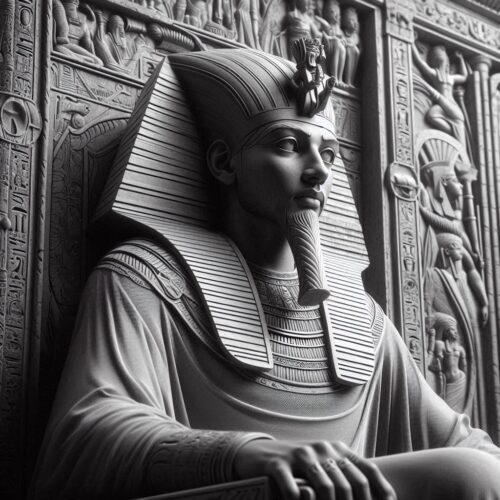Why Did God Harden Pharaoh’s Heart? The Reformed View
Why did God harden Pharaoh’s heart? Few passages in Scripture present a greater theological challenge than the account of God hardening Pharaoh’s heart during the Exodus. For Reformed believers, this raises particular questions about the relationship between divine sovereignty and human responsibility. Some may wonder: How can we maintain God doesn’t actively harden the hearts of the reprobate when Scripture explicitly states He hardened Pharaoh’s?
THE THEOLOGICAL TENSION
The Reformed tradition, following Augustine and Calvin, teaches that in reprobation, God passes over the non-elect, leaving them in their sins. This is typically understood as a passive act—God withholds saving grace rather than actively creating evil or hardness in their hearts. What God does with the elect, however, is different: He actively works on their hearts to bring them to salvation. Yet Exodus presents God actively declaring, “I will harden Pharaoh’s heart” (7:3), and then carrying out this hardening.
So how do Reformed theologians resolve the tension?
THE REFORMED CONSENSUS ON A RESOLUTION
Reformed theologians have traditionally resolved this by identifying Pharaoh’s hardening as a unique redemptive-historical act distinct from ordinary reprobation. John Calvin, in his commentary on Exodus, argues Pharaoh’s case serves a special purpose in God’s redemptive plan that differs from His ordinary dealings with the reprobate.
Herman Bavinck elaborates on this distinction, explaining that while God ordinarily leaves reprobates to their own devices (passive reprobation), in Pharaoh’s case God took extraordinary action for redemptive-historical purposes. This hardening wasn’t merely punitive but served to display God’s power and accomplish Israel’s redemption.
THE PURPOSE OF SPECIAL HARDENING
Why did God make this exception with Pharaoh? Reformed theologians point to God’s stated purpose in Exodus 9:16: “But I have raised you up for this very purpose, that I might show you my power and that my name might be proclaimed in all the earth.”
Francis Turretin argues that Pharaoh’s hardening served as a paradigmatic display of God’s sovereignty over His enemies, meant to instruct both Israel and the nations. This wasn’t simply about Pharaoh’s personal destiny but about God’s self-revelation in redemptive history.
THE NATURE OF THE HARDENING
Reformed theology distinguishes between God’s ordinary providential governance (including reprobation) and His special redemptive-historical acts. Jonathan Edwards explains that while God normally allows the reprobate to harden themselves by withholding grace, with Pharaoh God took the additional step of actively strengthening his resistance for redemptive purposes.
This special hardening didn’t create new evil in Pharaoh’s heart but rather confirmed and strengthened his existing rebellion. As Calvin notes, God hardened Pharaoh’s heart not by infusing evil but by providentially arranging circumstances that would lead to greater obstinacy.
RELATION TO GENERAL REPROBATION
The Reformed tradition maintains Pharaoh’s hardening doesn’t contradict the doctrine of passive reprobation because it represents a special case. Louis Berkhof explains that while God ordinarily leaves the reprobate to the natural consequences of their sin, He occasionally takes extraordinary action for special purposes in redemptive history.
This distinction helps maintain both the general Reformed teaching about reprobation and the biblical account of Pharaoh’s hardening. The exception proves the rule—God’s active hardening of Pharaoh stands out precisely because it differs from His ordinary dealings with the reprobate.
THEOLOGICAL IMPLICATIONS
This Reformed understanding has several important implications:
- It preserves the distinction between God’s ordinary providence and special redemptive acts
- It maintains divine sovereignty while avoiding making God the author of evil
- It explains how this unique case relates to God’s normal dealings with humanity
- It demonstrates how apparent theological contradictions can be resolved through careful distinction-making
CONCLUSION: WHY DID GOD HARDEN PHARAOH’S HEART?
The Reformed tradition resolves the tension between passive reprobation and Pharaoh’s hardening by recognising the latter as a unique redemptive-historical act. This preserves both the general truth about God’s dealings with the reprobate and the specific biblical account of Pharaoh’s hardening.
This resolution reminds us apparent contradictions in theology often dissolve through careful distinction-making. It also highlights how God’s extraordinary acts in redemptive history serve to reveal His character and purposes while remaining distinct from His ordinary providence.
Understanding this distinction helps us maintain the biblical witness without compromising Reformed doctrinal commitments. It calls us to approach Scripture with careful attention to both its unified message and its recognition of God’s special acts in redemptive history.
WHY DID GOD HARDEN PHARAOH’S HEART?—RELATED FAQs
Will Pharaoh be held accountable for his sins on Judgement Day, knowing his heart was hardened by God? Yes, Pharaoh will be held accountable because God’s sovereign hardening worked through Pharaoh’s own willing choices and desires. God’s predetermined plan didn’t force Pharaoh to act against his will but rather worked through his will, making his actions genuinely his own and therefore worthy of judgement.
- How does Pharaoh’s hardening relate to God’s justice? God’s justice is displayed in hardening those who’ve already freely chosen rebellion, using their willing evil for His good purposes. Reformed theology maintains that God’s hardening always builds upon pre-existing sin and rebellion, never creating evil in innocent hearts, thus maintaining both His justice and sovereignty.
- Does God harden the hearts of other individuals in Scripture? Yes, Scripture records other instances of divine hardening, such as Sihon king of Heshbon (Deuteronomy 2:30) and the Canaanite nations (Joshua 11:20). These cases serve specific redemptive-historical purposes similar to Pharaoh’s hardening. However, Pharaoh’s case remains the most detailed example and serves as the paradigmatic instance of this divine act.
Can the elect experience hardening of the heart? While the elect can experience temporary spiritual dullness or resistance, true believers cannot experience the kind of judicial hardening that leads to final impenitence. The Spirit’s preserving work ensures that any hardening in believers will be temporary and ultimately serve their sanctification.
- What role does human free will play in the hardening of hearts? Reformed theology teaches that we freely choose according to our nature, even under divine hardening. God’s hardening works through human choices, not against them, so that individuals willingly choose rebellion even while God sovereignly directs these choices to serve His purposes.
- How should believers respond to the doctrine of hardening? Believers should respond with humble fear of God, recognising that resistance to His word carries serious consequences. This doctrine should also increase our gratitude for God’s preserving grace and deepen our trust in His sovereign control over all human affairs.
Is the hardening of hearts a permanent state? In cases of divine judicial hardening like Pharaoh’s, the hardening typically leads to final impenitence. However, ordinary hardening resulting from human rebellion can be overcome by God’s grace, as demonstrated in cases where God grants repentance to previously hardened sinners.
WHY DID GOD HARDEN PHARAOH’S HEART?—OUR RELATED POSTS
Editor's Pick

Paul’s Mandate for Men: Headship Or Servant Leadership? Or Both?
Modern Christianity has fallen into a trap. We've created an either/or battle between "headship" and "servant leadership," as if these [...]

Should We Stop Using Male Pronouns for God? Why Do We Say No?
A friend of ours arrived eagerly at his first theology class in seminary. But he quickly discovered something troubling: the [...]

Did Old Testament Law Force Women to Marry their Rapists?
**Editor’s Note: This post is part of our series, ‘Satan’s Lies: Common Deceptions in the Church Today’… Viral misinformation abounds [...]

From Danvers To Nashville: Two Statements, One Biblical Vision
30 years separate the Danvers Statement on Biblical Manhood and Womanhood (1987) and the Nashville Statement on Human Sexuality (2017). [...]

The Nashville Statement: Why Affirm It Despite Media Backlash?
WHY DO REFORMED CHRISTIANS STAND BY THIS STATEMENT ON MARRIAGE AND GENDER? When the Nashville Statement was released in 2017, [...]

Who Is Belial? Solving The 2 Corinthians 6:15 Mystery
Belial: This name from the pages of Scripture chills the soul. Who is this mysterious figure Paul invokes in 2 [...]

Celibacy Or Castration: What Jesus Really Means in Matthew 19:12
One of Scripture's most shocking misinterpretations led theologian Origen to castrate himself in the third century. His tragic mistake? Taking [...]

Philippians 4:13: Did Paul Really Mean We Can Do ALL Things?
"I can do all things through Christ who strengthens me." It's on gym walls, graduation cards, and motivational posters everywhere. [...]

The Ordinary Means of Grace: Why Are They Indispensable?
ORDINARY MEANS FOR EXTRAORDINARY TRANSFORMATION What if God's most powerful work in believers' lives happens through the most ordinary activities? [...]

Is the Bible God’s Word? Or Does It Only Contain God’s Word?
The authority of Scripture stands at the crossroads of modern Christianity. While some argue the Bible merely contains God’s Word [...]
SUPPORT US:
Feel the Holy Spirit's gentle nudge to partner with us?
Donate Online:
Account Name: TRUTHS TO DIE FOR FOUNDATION
Account Number: 10243565459
Bank IFSC: IDFB0043391
Bank Name: IDFC FIRST BANK






